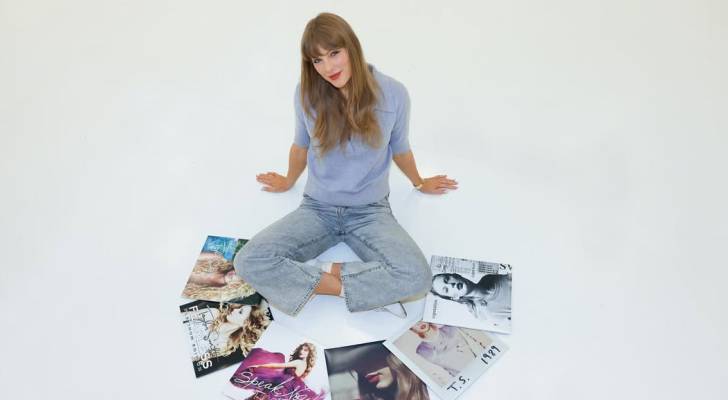Taylor Swift with her first six albums (Credit: Taylor Swift via Instagram)
Taylor Swift finally owns her music after years-long battle
Taylor Swift has officially reclaimed the rights to her first six albums, concluding a long-running and highly publicized dispute over control of her music.
The pop icon announced the milestone on her website, writing, “All of the music I've ever made now belongs to me. I've been bursting into tears of joy... ever since I found out this is really happening."
The conflict began in 2019 when music executive Scooter Braun acquired Swift's former label, Big Machine, gaining control of her master recordings for Taylor Swift, Fearless, Speak Now, Red, 1989, and Reputation. Swift objected to the sale, citing personal and professional issues with Braun and criticizing what she saw as a pattern of manipulation, particularly related to her feud with Kanye West—one of Braun's clients.
The pop star said regaining control over her catalogue once seemed impossible. “To say this is my greatest dream come true is actually being pretty reserved about it,” she wrote. “I almost stopped thinking it could ever happen, after 20 years of having the carrot dangled and then yanked away. But that's all in the past now.”
Artists who own their masters have the ability to decide how their music is used—whether it appears in commercials, movies, or reissues—rather than leaving those decisions to third parties. While Swift had always retained her publishing rights, her lack of ownership over the recordings themselves limited her control.
In response to the 2019 sale, Swift began re-recording her old material in a move that diminished the commercial value of the original recordings while allowing her to regain creative and economic control. Since then, she has released reimagined versions of four albums, dubbed "Taylor’s Versions," which include updated tracks and previously unreleased songs.
In her letter, Swift shared that progress on a re-recorded version of Reputation had stalled. “The Reputation album was so specific to that time in my life,” she explained. “To be perfectly honest, it's the one album in those first six that I thought couldn't be improved by re-doing it... so I kept putting it off.” However, she teased the release of “vault tracks” from the era, saying they'd be made available “if fans were into the idea.”
She also confirmed that a refreshed version of her 2006 self-titled debut is complete, writing, “I really love how it sounds now.”
Swift’s journey toward ownership began with a deal she signed as a teenager in 2004 with Big Machine. Like many young artists at the time, she traded master rights for support in producing and distributing her music. That contract expired in 2018, and she signed with Republic Records and Universal Music Group. The following year, Braun acquired Big Machine in a USD 300 million deal—news Swift said she learned about only after the sale was finalized.
She expressed outrage over the situation at the time, calling it “the second time my music had been sold without my knowledge” after Braun’s stake was later sold to Shamrock Holdings. Though she considered working with the investment firm, she learned Braun would continue to benefit financially from her catalogue, which led her to walk away from that option as well.
By 2021, Swift was rolling out re-recorded albums with meticulous attention to detail, including Fearless (Taylor’s Version) and Red (Taylor’s Version). Her revamped 10-minute version of All Too Well became a fan favorite and made history on the charts.
Meanwhile, Swift continued to build her career with original music, including the critically acclaimed albums Folklore and Midnights. Her success culminated in the record-breaking Eras Tour, which grossed more than USD 2 billion globally.
“The success of the Eras tour is why I was able to buy back my music,” Swift noted in her letter, crediting her fans with helping make it possible. “Every single bit of it counted, and ended us up here.”
Swift also emphasized how her fight has inspired younger musicians to demand ownership of their own work. “Every time a new artist tells me they negotiated to own their master recordings in their record contract because of this fight, I'm reminded of how important it was for all of this to happen.”
Though the financial terms of Swift’s buyback haven’t been made public, industry sources suggest previous reports estimating the cost at USD 600 million to USD 1 billion are exaggerated.
Ultimately, Swift says this victory is not rooted in bitterness but celebration. “Those two albums can still have their moments to re-emerge when the time is right,” she wrote. “But if it happens, it won't be from a place of sadness and longing... It will just be a celebration now.”




